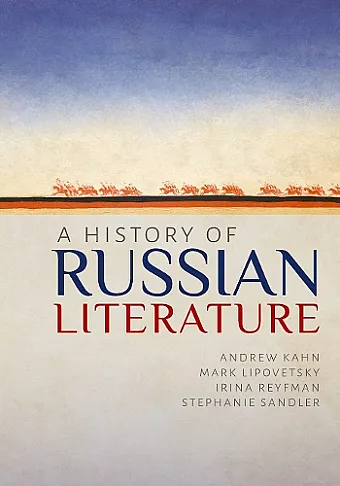A History of Russian Literature
Andrew Kahn author Mark Lipovetsky author Irina Reyfman author Stephanie Sandler author
Format:Paperback
Publisher:Oxford University Press
Published:11th May '23
Currently unavailable, and unfortunately no date known when it will be back

Russia possesses one of the richest and most admired literatures of Europe, reaching back to the eleventh century. A History of Russian Literature provides a comprehensive account of Russian writing from its earliest origins in the monastic works of Kiev up to the present day, still rife with the creative experiments of post-Soviet literary life. The volume proceeds chronologically in five parts, extending from Kievan Rus' in the 11th century to the present day. The coverage strikes a balance between extensive overview and in-depth thematic focus. Parts are organized thematically in chapters, which a number of keywords that are important literary concepts that can serve as connecting motifs and 'case studies', in-depth discussions of writers, institutions, and texts that take the reader up close and personal. Visual material also underscores the interrelation of the word and image at a number of points, particularly significant in the medieval period and twentieth century. The History addresses major continuities and discontinuities in the history of Russian literature across all periods, and in particular brings out trans-historical features that contribute to the notion of a national literature. The volume's time range has the merit of identifying from the early modern period a vital set of national stereotypes and popular folklore about boundaries, space, Holy Russia, and the charismatic king that offers culturally relevant material to later writers. This volume delivers a fresh view on a series of key questions about Russia's literary history, by providing new mappings of literary history and a narrative that pursues key concepts (rather more than individual authorial careers). This holistic narrative underscores the ways in which context and text are densely woven in Russian literature, and demonstrates that the most exciting way to understand the canon and the development of tradition is through a discussion of the interrelation of major and minor figures, historical events and literary politics, literary theory and literary innovation.
This exhaustive volume represents a very significant contribution to the bibliography of Russian literary history from the medieval to the modern period. In its scope, conception, and engagement with scholarship, this is the kind of account which comes along only once every generation, a work informed by the lifelong study of four preeminent scholars of Russian literature from both sides of the Atlantic. ...The authors have been extraordinarily thorough throughout in their generous engagement with the scholarship and secondary literature in both Russian and English. ...It will inevitably feature in the comprehensive exam lists of all graduate students of Russian literature. * Kate Holland, Slavic Review *
The Oxford History paves the way * Caryl Emerson, Princeton University, Slavonic and East European Review *
All academic fields are under pressure to be constantly open to shifting global perspectives and previously unheard voices. Can even the most meticulous hard-copy linear narrative hope to keep up with these challenges? In my view, the new Oxford A History of Russian Literature, a staggering accomplishment, manages to do so. * Carly Emerson, Princeton University, Slavonic and East European Review *
This new history of Russian literature written by four Slavists is an interesting and useful book. It is a very timely book... It is informative, the material, nonetheless, fits compactly in one volume. It covers the familiar and also offers an abundance of unusual solutions/positions. It is addressed to the Anglophone readers but holds just as much interest for the Russian. The sociological approach that the authors maintain is realized in the special attention to institutions and conditions in which literature functions (from Ancient Russia to post-perestroika Russia); to the evolution of subjectivity, manifested in literary forms that also give evidence of the self-awareness of man in different periods; to the narratives that, on the one hand, can be extracted from texts and, on the other, form national identity. Literature both mirrors societal life and defines it. * Translated from New Literary Observer (Novoe literaturnoe obozrenie) *
Of particular importance to nonspecialists will be inclusion throughout of detailed definitions of key literary and historical terms. A section of color plates, along with black-and-white illustrations, afford welcome visual perspective. The bibliography and endnotes are exhaustive and have already served this reviewer's further investigations. This comprehensive, articulate history should prove invaluable to a broad readership. ... Summing up: "Essential". * CHOICE *
what Kahn, Lipovetsky, Reyfman and Sandler have managed to encompass and contextualize ... is nothing short of staggering. * Boris Dralyuk, Times Literary Supplement *
- Winner of Finalist of the 2019 PROSE Award in Literature by the Association of American Publishers Honourable Mention from the MLA Aldo and Jeanne Scaglione Prize for Studies in Slavic Languages and Literatures.
ISBN: 9780192864031
Dimensions: 246mm x 172mm x 58mm
Weight: 1262g
960 pages